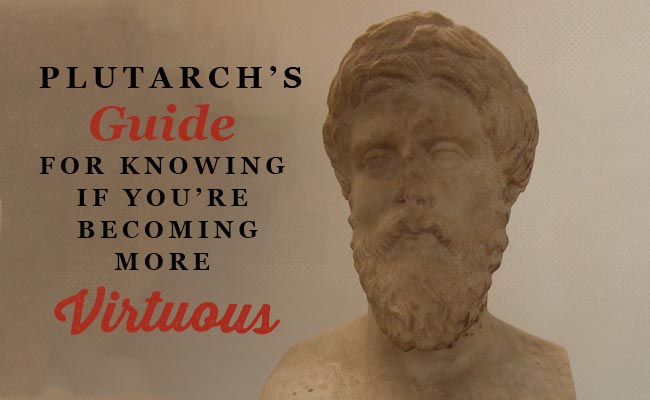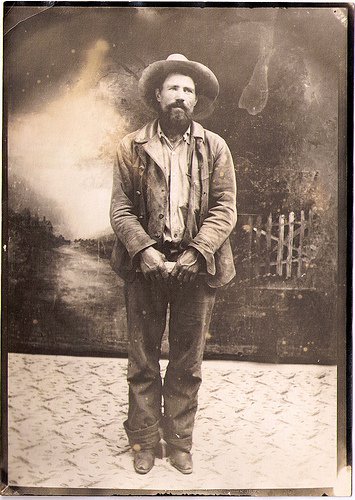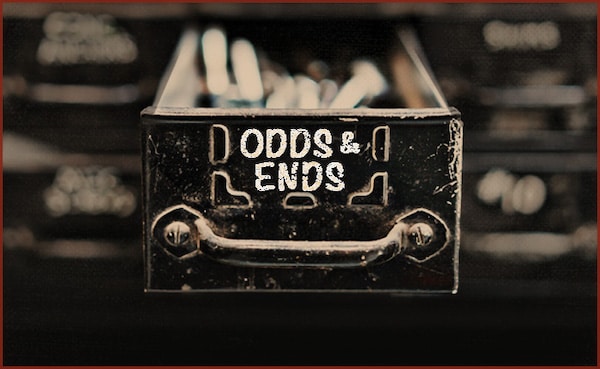
In most areas of your life that you seek to improve, there’s an external metric you can look at in order to see if you’re getting better.
Your pants get looser as you lose weight.
Your kettlebells get heavier as you get stronger.
Your net worth increases as you get wealthier.
But how do you know if you’re becoming a better and more virtuous man? There isn’t really a hard metric that you can point to that shows that you’re becoming more virtuous. And without some sort of metric, it can be difficult to know whether or not you’re progressing.
Honing your character and making honorable decisions isn’t about outcomes: you do the right thing because it’s the right thing; you do Good because it is Good. But it is important to know if you’re actually improving or not. It’s important to know if the habits and practices you’ve implemented are really working, and whether you’re just fooling and flattering yourself as to how you’re showing up in the world and showing up for others.
So too, without being able to see your progress, it can be hard to stay motivated to live virtuously. You can end up wondering, “Is all my effort actually getting me anywhere?”
The Greek philosopher and historian Plutarch observed this conundrum 2,000 years ago. Most people know Plutarch for his Lives of Famous Greeks and Romans. But besides writing these epic, moral-education-imparting biographies, Plutarch also penned several short essays about different facets of living an upright life. Among these, there’s one that I keep coming back to: “How a Man May Become Aware of His Progress in Virtue.”
Plutarch begins the essay by noting that part of the reason it’s hard to gauge moral progress is that character improvement happens so gradually; there’s rarely a night and day transition from bad to good or good to better. Moral progress is a lot like the seasons: one day it’s winter and the landscape is nothing but bare branches; then, seemingly overnight, though the process has in fact been in motion for quite awhile, you notice that green foliage has sprouted on all the trees.
While recognizing progress in virtue can be difficult, Plutarch argues that it’s not impossible, and he proposes a set of signs that people can survey to gauge their moral improvement.
Below, using selections of Plutarch’s words, I delineate what I think are the most important signs the philosopher recommends looking for. If your interest is piqued, I highly recommend reading the essay in its entirety.
1. Your motivation and desire to become virtuous has increased.
“It is another very good argument to prove that by labor and exercise you have shaken off all stupidity and sluggishness, if for the future your resolutions be more firm and your application more intense than they were when you first set out.”
2. You notice, and grieve, when you’re less virtuous.
“In love, it is a sign the passion is predominant, if the lover be not only pleased in the enjoyment of the beloved object (for that is ordinary), but also troubled and grieved at the absence of it.”
3. You’ve gotten a handle on your jealousy and envy.
“you may collect this great truth, that whenever you . . . perceive that you have utterly expelled all emulation, jealousy, and every thing else that . . . disturb[s] or discourage[s] young men, you may then assuredly conclude with yourself that you have made very laudable progress.”
4. You don’t let the empty ways other people seek status deter you from your own path.
“[You are] not cut to the heart and repine, when you are told that such and such persons by name, your equals once, live splendidly at court, have married great fortunes . . . He that is neither discomposed nor very much affected by such news as this is manifestly in the right, and has philosophy by the surer handle. For it is impossible we should leave admiring things which most men esteem, if the habit of virtue were not deeply rooted in us. To avoid passionately what every one cries down may be in some persons the effect of anger and ignorance; but utterly to despise what is admired abroad is a certain sign of true and solid wisdom and resolution.”
5. You’re discriminating in the media you choose to read/listen to, and consume it not only for pleasure, but also for personal improvement.
“Whenever you read the writings or hear the orations of the philosophers . . . be not taken with what is curious and of a delicate thread and contexture, more than that which is strong . . . and beneficial. So also, in perusing poems or histories, be sure that nothing escape you that is appositely said, in relation to the cultivating of manners or the calming turbulent, immoderate passions; but always give it a note, and make it surely your own.
Simonides said that a student in philosophy should be like a bee. That laborious creature, when it is amongst flowers, makes it its business industriously to extract the yellow honey out of them all; while others care and seek for nothing else except the smell and the color. So, while some others employ their time in reading the poets only for diversion, or for the wit and fancy which usually adorn their works, you (my dear friend) like a bee amongst a swarm of drones, observe and collect what is sweet, palatable, and worthy your pains.”
6. You don’t just study virtue abstractly; you turn what you read into concrete practice.
“[It isn’t] a difficult matter to attain such a temper of mind, if the candidates for virtue intermix discourse and reading with their actions; not only ‘exercising themselves amidst dangers’ (as Thucydides said to some), but also engaging pleasures, disputing hard questions, examining precedents, pleading causes, and so (to try themselves thoroughly) undertaking some magistracy or public office, giving thereby demonstration of their opinions and resolution, or rather establishing their resolution by exercise. Whereas, those that are not bred to it, but like novices spy out and catch at anything that is curious in books, and pragmatically run away with it either to the Exchange, the College, or some club or tavern, deserve no more the name of philosophers, than those quacks that only truck off vile drugs and potions merit the character and value of physicians.”
7. You don’t toot your own horn when you do virtuous acts and do the right thing even when no one is looking.
“Another sign of a proficient in virtue is, when the proficient has given any thing to his friend or done any kindness for any one, if he keeps it to himself and does not blab it to anybody; and (which is more) if he hath . . . withstood the dishonest attempts of some rich and powerful man, generously rejected bribes when offered, abstained from inordinate drinking when athirst and alone, or at night, when none sees or knows what he does, lastly, if he hath conquered the briskest attempts of love (as is said of Agesilaus); if (I say) he contain himself from speaking of such actions, and do not in company boast of his performances. This I affirm — such a one as can prove and try himself by himself, and be fully satisfied in the verdict of his conscience, as of an unexceptionable witness and spectator of what is right and good, shows plainly that his reason looks inward and is well rooted within him, and that the man (as Democritus said) is accustomed to take satisfaction from himself.”
8. You are honest with friends, who are honest with you.
“But the greatest character of hopeful men, and such as may be probably excellent proficients in time, belongs to those who, upon a commission of a fault, immediately apply themselves to such as will reprove and correct them; who plainly disclose their grief and open their malady; who do not rejoice in concealing their distemper, and are not content to have their troubles unknown; lastly, who make a full confession of what they have done amiss, and desire the help of a friend to examine and direct them for the future.”
9. You’re self-aware, frankly recognize when you’re falling short, and welcome consequent feelings of shame and conviction.
“He that examines his own failings with the greatest severity, that impartially blames or corrects himself as often as he does amiss, or (which is almost as commendable) grows firmer and better by present advice, as well as more able and ready to endure a reprimand for the future, seems to me truly and sincerely to have rejected and forsaken vice.”
10. You seek to emulate virtuous men.
“For this is an especial sign of true proficiency, to love and affect their way of life whose actions we emulate, and, upon account of an honorable opinion we always entertain for them, to do as they do.”
11. You’re calmer and feel more in control.
“Considering that progress seems to consist in a certain remission and moderation of those very passions we carry about us, it unavoidably follows, that if we will observe our passions, with relation to one another and also to themselves, we may easily find out their differences. For example, first, we may observe from the passions compared with themselves whether our desires be now more moderate than they used to be, fear and anger less and more calm, and whether or no we are more able to quench the heat and flame of our passions than we used to be.”
12. You don’t feel like you have anything to hide; you confidently welcome the assessing eyes of family and friends.
“Consider this, if a young man thrive in the world, it is customary for him to desire nothing more than to be seen in the company of virtuous and good men, to show them his whole furniture, his table, his wife and children, his study, his diary or collections; and he is so pleased with himself, that he wishes his father or tutor were alive, that they might see him in so good a way of living; and he could heartily pray that they were alive, to be spectators of his life and actions. But, on the contrary, those that have neglected their business, or lost themselves in the world, cannot endure the sight or company of their relations without a great deal of fear and confusion.”
13. You humbly realize that no matter how much you’ve learned, you still don’t have it all figured out.
“So it is amongst students in philosophy; those that are most empty-headed, and have least firmness and solidity, have always the greatest share of confidence, formality, and stiffness in their address, look biggest, walk with the most state, and top upon and condemn others, with the highest arrogance and severity of any living. But when once their brains begin to fill and become well poised with solid notions, they look down into themselves, and quite lay aside that insolent and arrogant humor, which is proper only to youngsters.”






